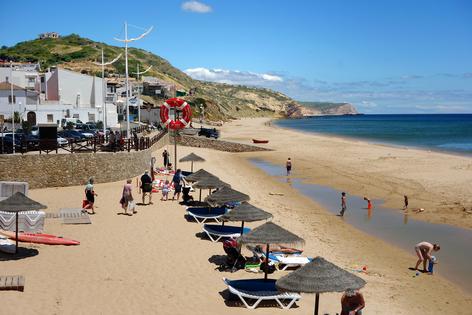Rick Steves’ Europe: Portugal’s sunny Salema
As we’ve had to postpone our travels because of the pandemic, I believe a weekly dose of travel dreaming can be good medicine. Here's one of my favorite European memories from Portugal’s Algarve, the sunny south coast of my travel dreams — a reminder of the fun that awaits us at the other end of this crisis.
The flatbed fish truck rambles into the village tooting the “1812 Overture” on its horn. Today’s my beach day and I was ready to just sleep in. But it’s market day in Salema and the parking lot that separates the jogging shorts from the black shawls fills up, one vehicle at a time, with horn-tooting merchants. First the fish truck rolls in, then the bakery trailer steaming with fresh bread, followed by a fruit-and-vegetable truck, and finally a five-and-dime truck for clothing and odds and ends. Groggy yet happy, I quickly get dressed and join the scene — savoring one of the last true villages on the Algarve.
Any place that’s famous as a “last undiscovered tourist frontier” probably no longer is. But the Algarve of my dreams survives — just barely. It took me three tries to find it. West of the big city of Lagos, Luz and Burgau both offered only a corpse of a fishing village, bikini-strangled and Nivea-creamed. Then, just as darkness turned couples into peaceful silhouettes, I found Salema.
It’s my kind of resort: three beachside streets, a dozen restaurants, a few hotels, time-share condos up the road, a couple of bars, English and German menus, a classic beach with a paved promenade, and endless sun.
Where a small road hits the beach on Portugal’s southwestern tip, Salema is an easy 15mile bus ride from the closest train station in Lagos. Still a fishing village — but only barely — Salema has a split personality: The whitewashed old town is for residents, and the more utilitarian other half was built for tourists.
Residents and tourists pursue a policy of peaceful coexistence at the beach, luxurious with powder-fine sand and framed by steep vivid-yellow cliffs. Tractors pull in and push out the fishing boats, two-year-olds toddle in the waves, topless women read German fashion mags, and old men really do mend the nets. British and German connoisseurs of lethargy laze in the sun, while locals grab the shade.
While the days of black-clad widows chasing topless Nordic women off the beach are gone, nudity is still risqué. Over the rocks and beyond the view of prying eyes, Germans grin and bare it.
Unwritten tradition allocates different chunks of undersea territory to each Salema family. While the fishermen’s hut on the beach no longer hosts a fish auction, it provides shade for the old-timers arm-wrestling octopi out of their traps. The pottery jars stacked everywhere are traps, which are tied about a yard apart in long lines and dropped offshore. Octopi, looking for a cozy place to set an ambush, climb inside, unaware they’ve made their last mistake.
Whatever’s caught is served up by the wives of fishermen in huge pots of Portugal’s beloved seafood stew (cataplana) inside steamy hole-in-the-wall eateries, where tourists slurp it up.
Salema’s tourist-based economy sits on a foundation of sand. As locals watch their sandy beach wash away each winter, they hope and pray it will return with spring.
Restaurateurs are allowed to build a temporary, summer-only beachside restaurant if they provide a lifeguard and run a green/yellow/red warning-flag system for swimmers. The Atlântico Restaurant, which dominates Salema’s beach, takes its responsibility seriously — providing lifeguards and flags through the summer . . . and fresh seafood by candlelight all year long.
Tourism chases the sun and quaint folksiness. And the folksiness survives only with the help of tourist dollars. Fishermen boost their income by renting spare bedrooms (quartos) to the ever-growing stream of tan fans from Europe’s drizzly north. Quartos line Salema’s main residential street, offering simple rooms with showers, springy beds, and glorious Atlantic views.
Salema’s sleepy beauty kidnaps my momentum. At the end of the day, after enjoying a nice plate of fish, I take a glass of white wine from Atlântico and sip it with the sunset. Nearby, a withered old woman shells almonds with a railroad spike, dogs roam the beach like they own it, and a man catches short fish with a long pole. Beyond him is Cape Sagres — 500 years ago, it was the edge of the world. As far as the gang sipping port and piling olive pits in the beachside bar is concerned, it still is.
========
(Rick Steves (www.ricksteves.com) writes European guidebooks, hosts travel shows on public TV and radio, and organizes European tours. This article was adapted from his new book, For the Love of Europe. You can email Rick at rick@ricksteves.com and follow his blog on Facebook.)
©2020 Rick Steves. Distributed by Tribune Content Agency, LLC.
(c)2021 RICK STEVES DISTRIBUTED BY TRIBUNE MEDIA SERVICES, INC.














Comments